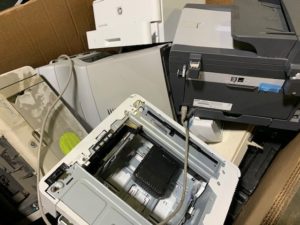Some of the electronics that were on the cutting edge a decade ago are nearly obsolete now. (Here’s looking at you, iPod Touch.) Electronics of all kinds have limited lifespans. When you’re done with them, you could turn a storage room into an electronics graveyard – but why do that when you have electronics recycling options that help your company practice sustainability and protect its data?
 If you’ve hesitated to embrace electronics recycling because it seems too confusing, or unnecessary, or too expensive, you’re in good company. There’s a ton of misinformation out there that makes electronics recycling seem more daunting than it really is.
If you’ve hesitated to embrace electronics recycling because it seems too confusing, or unnecessary, or too expensive, you’re in good company. There’s a ton of misinformation out there that makes electronics recycling seem more daunting than it really is.
Myth #1: Proper Electronics Recycling is All About Data Protection
Improperly disposing of electronics is a data security issue, but it’s also an environmental issue. E-waste poses health and safety risks for people and can do tremendous harm to the environment. Common electronics are made with components and chemicals (including lead, lithium and mercury) that make them hazardous waste. Putting those devices in landfills may introduce those substances into the soil, air and/or water.
There’s another potential hazard in that landfill pickers sometimes scour these areas for electronics with cables containing copper wire. They access the copper by burning the plastic tubing, releasing toxic chemicals into the air (and creating a fire risk). Electronics components have to be recycled by professionals who know how to handle them.
Myth #2: Only Computers Pose a Data Security Risk
You know not to throw away anything that stores documents, like thumb drives or a laptop with an intact hard drive. Trashing those items leaves your company’s data insecure by making it accessible to anyone who finds it. What some people don’t realize is just how many different kinds of electronics can hold data. Unusable old office equipment like printers, fax machines and old phones may have working memory components. Depending on the age and model of your copier, it might be holding onto images of everything that was copied on it.
Televisions should also be recycled rather than landfilled. They’re not as much of a data security risk, though; smart TVs may transmit user data to the manufacturer but don’t generally store sensitive data. Still, with technology changing all the time, it’s a good idea to get in the habit of taking a better-safe-than-sorry approach to recycling electronics. There’s no telling what types of data storage capacity your future devices will have.
Myth #3: Electronics Recycling is Optional
Depending on where your business is located, participating in electronics recycling may not be something you can opt out of. As of 2019, 25 states (including Massachusettts) and Washington, D.C. have e-waste laws on the books. Most of those states have laws requiring manufacturers of certain products to take responsibility for making sure each product is properly disposed of at the end of its lifespan.
Additionally, some states have disposal bans preventing consumers and businesses from landfilling various types of e-waste. Even some states without broad e-waste laws have some legislation regarding e-waste. For example, in Massachusetts, the Mercury Management Act makes it illegal to dispose of mercury-containing products (including LCD screens and monitors) in the trash.
Myth #4: Electronics Recycling is Logistically Difficult
If you already have an electronics graveyard in an old storage room, there’s a good chance it’s because you simply don’t know how to get rid of all of it. Electronics can’t go in any of your trash or recycling receptacles. Your city might have drop-off events for bulky electronics, but you’d have to get all those old printers and desktop monitors into vehicles and drive them over – and besides, those events may not accept drop-offs from businesses. Forget it, that old junk can stay in the storage room.
No matter how big or bulky your electronics are, properly recycling them might be easier than you think. Many recycling companies (including Miller Recycling) offer both drop-off and pickup options. Emptying that storeroom could be as simple as tossing everything into a collection container and scheduling pickup.
To learn more about electronics recycling, or about the data destruction services of our sister company, Northeast Data Destruction, contact Miller Recycling today!

